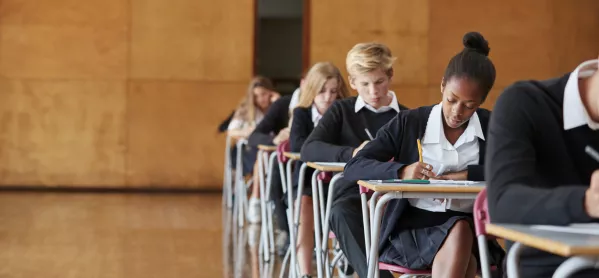
- Home
- SQA exams 2021: How will Highers be taken next year?
SQA exams 2021: How will Highers be taken next year?

After this year’s exams were cancelled, Scottish teaching unions called for next year’s qualifications to be based on continuous assessment and teacher judgment, arguing that too much teaching time was going to be lost to run a normal schedule.
Students had been out of school for weeks due to the coronavirus lockdown, they said at the time, and when they returned the plan was for part-time attendance in school to accommodate 2m social distancing.
But all that changed on 23 June when the education secretary, John Swinney, said that schools should prepare for pupils to attend full time with no social distancing.
So what should senior pupils and teachers expect now? Here, we take a look at how students were assessed in 2019-20, and what the government has said so far about its plans for next year.
Coronavirus: What about next year’s exams in Scotland?
How were pupils assessed in 2019-20?
The Scottish government took the decision to cancel the exams on 19 March. Instead, it was decided that the qualifications that senior pupils receive on 4 August should be based on teacher estimates.
However, Scottish Qualifications Authority (SQA) plans to moderate these teacher judgements using a school’s historical data, in addition to the past attainment of individual pupils, have proven controversial.
Background: Exams cancelled in Scotland
Related: Teachers’ estimates ‘the core element of the certification process’
News: SQA grilled over fairness of system replacing exams
Opinion: ‘Use school closures to reset exam system’
Why is moderation controversial?
It has been argued that high-achieving students in traditionally low-attaining schools - which are usually in more deprived areas - could find their grades moderated down because their performance does not fit with the SQA’s profile of the school.
Teaching unions and headteachers’ organisations have urged the SQA to enter into a dialogue with schools if statistical modelling throws up a discrepancy between its estimated grades and historical attainment data.
But the SQA has now made it clear that the “very tight timescales” it is working to mean that won’t be happening - it says the appeals process will allow for “further, evidence-based consideration of grades if schools and colleges do not think awarded grades fairly reflect learner performance”.
So will the same system for awarding qualifications be in place in the coming school year?
No. The Scottish government has said it is planning to run the traditional exam diet.
What do teachers make of that?
The teaching unions had said that next year’s exams should be cancelled. Larry Flanagan, general secretary of the biggest union - the EIS - told Tes Scotland that results should be “based on a combination of teacher judgement and continuous assessment”. But that was before Mr Swinney announced that he was now working on the basis that schools would be back full-time from August, with no social distancing between pupils.
So the hope is that students will learn and sit exams as normal in 2021?
Not quite, because they usually embark on their new courses for the final month of school between the exams finishing and the start of the summer holidays. We know, of course, that learning was still going on from home in June this year but engagement was variable and some students - particularly those from disadvantaged backgrounds without devices and reliable internet connections - struggled to access online education platforms.
How will this lost learning time be compensated for?
Mr Swinney has said that the exams might be delayed by “a matter of weeks” in 2021 to allow more time for learning and teaching. It has been pointed out, though, that this will have a knock-on effect for the following school year because, again, the teaching time that would usually be available before the summer break will be lost.
And what if there is a second wave of coronavirus?
Speaking toTes Scotland during a podcast recorded on 3 July, Mr Swinney said that he expected the guidance on the evidence teachers should be gathering in case of another lockdown to be “available to schools when they return in the autumn”.
What’s the response been from teachers?
There are concerns that whilst the Scottish government talks a good game when it comes to prioritising pupils’ mental health and wellbeing, when they return to school - to secondaries, in particular - this will be difficult if there are no changes to courses. Also, some teachers had hoped the lockdown and move away from exams this year might have led to longer-term change.
One teacher writing for Tes Scotland asked: “Why are we basing the success of a nine-month course on a one-off performance in a 90-minute paper?” However, in the aforementioned Tes Scotland podcast, Mr Swinney hinted that he might be open to change - just not next year, if he can help it.
Register with Tes and you can read five free articles every month, plus you'll have access to our range of award-winning newsletters.
Keep reading for just £4.90 per month
You've reached your limit of free articles this month. Subscribe for £4.90 per month for three months and get:
- Unlimited access to all Tes magazine content
- Exclusive subscriber-only stories
- Award-winning email newsletters
You've reached your limit of free articles this month. Subscribe for £4.90 per month for three months and get:
- Unlimited access to all Tes magazine content
- Exclusive subscriber-only stories
- Award-winning email newsletters



